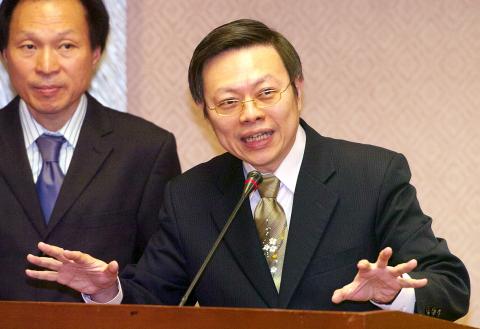China’s cultural “united front “tactics, its persistent and gradual “brainwashing” of Taiwanese and the government’s indifference to the issue could eventually wipe out Taiwan’s unique culture, Democratic Progressive Party (DPP) lawmakers said yesterday.
The hosting of a Chinese music awards ceremony, the widespread use of Chinese terminology in Taiwan and the increasing number of cultural projects in the name of cross-strait collaboration could all be part of China’s efforts to absorb Taiwan, DPP lawmakers said at a meeting of the legislature’s Internal Administration Committee.
They cited the increasing use of the word neidi (內地, “inland”) by entertainers when referring to China and more television stations airing China-produced dramas during prime time as examples.

Photo: Wang Min-wei, Taipei Times
Chen Ming-wen (陳明文) described the moves as an “invisible annexation and cultural bullying” and warned that it could create a false perception that Taiwan and China belong to the same country.
Mainland Affairs Council Minister Wang Yu-chi (王郁琦) agreed that the use of the word neidi was inappropriate and pledged to call on entertainers to stop using it publicly. He promised that the council would issue an official statement on the issue.
The lawmakers also questioned the production of Ripples of Desire (花漾), a joint Taiwanese and Chinese production, with the government’s National Development Fund (NDF) and TC-1 Culture Fund, of which show business mogul Wang Wei-chung (王偉忠) serves as a board member, investing NT$35 million (US$1.2 million) each.
Deputy Minister of Culture George Hsu (許秋煌) said Beijing investors paid a copyright fee of NT$41.9 million for the distribution rights in China and promised a 2 percent bonus if box office receipts exceeded NT$256 million.
DPP Legislator Tuan Yi-kang (段宜康) said the Ministry of Culture had failed to pay attention to the unfair deal and the film was listed as a Chinese film despite Taiwan being the major investor.
Tuan also questioned the role of Wang, who has been criticized for playing multiple roles as a recipient of NDF funding and negotiator of several cross-strait cultural projects. He said many more people like Wang were reaping benefits from the government’s so-called “cross-strait cultural creative exchanges.”
Tuan said that Wang and people such as the family of New Party Chairman Yok Mu-ming (郁慕明), who were granted the exclusive rights to sell Taiwan Tobacco and Liquor Corp’s cigarette products in China, would not be in the position to make money if they were not designated by Beijing.
The ministry’s failure to promote Taiwanese culture in cross-strait exchanges will push Taiwan’s unique and diverse culture to the brink of extinction, DPP Legislator Chen Chi-mai (陳其邁) said.
More than half of the films receiving NDF fundings were produced with themes related to Chinese history or culture, not Taiwanese, Chen said.
DPP Legislator Pasuya Yao (姚文智) blasted the council for not responding immediately to Beijing’s oppression of the Southern Weekly newspaper, which was forced to change its New Year article calling for constitutional rights protection.
Wang said the council had always urged Beijing to respect freedom of speech.
Additional reporting by Shelley Shan

The Central Weather Administration (CWA) yesterday said it expected to issue a sea warning for Typhoon Fung-Wong tomorrow, which it said would possibly make landfall near central Taiwan. As of 2am yesterday, Fung-Wong was about 1,760km southeast of Oluanpi (鵝鑾鼻), Taiwan’s southernmost point, moving west-northwest at 26kph. It is forecast to reach Luzon in the northern Philippines by tomorrow, the CWA said. After entering the South China Sea, Typhoon Fung-Wong is likely to turn northward toward Taiwan, CWA forecaster Chang Chun-yao (張峻堯) said, adding that it would likely make landfall near central Taiwan. The CWA expects to issue a land

Taiwan’s exports soared to an all-time high of US$61.8 billion last month, surging 49.7 percent from a year earlier, as the global frenzy for artificial intelligence (AI) applications and new consumer electronics powered shipments of high-tech goods, the Ministry of Finance said yesterday. It was the first time exports had exceeded the US$60 billion mark, fueled by the global boom in AI development that has significantly boosted Taiwanese companies across the international supply chain, Department of Statistics Director-General Beatrice Tsai (蔡美娜) told a media briefing. “There is a consensus among major AI players that the upcycle is still in its early stage,”

The Central Weather Administration (CWA) yesterday said it is expected to issue a sea warning for Typhoon Fung-wong this afternoon and a land warning tomorrow. As of 1pm, the storm was about 1,070km southeast of Oluanpi (鵝鑾鼻), Taiwan’s southernmost point, and was moving west-northwest at 28 to 32kph, according to CWA data. The storm had a radius of 250km, with maximum sustained winds of 173kph and gusts reaching 209kph, the CWA added. The storm is forecast to pass near Luzon in the Philippines before entering the South China Sea and potentially turning northward toward Taiwan, the CWA said. CWA forecaster Chang Chun-yao (張峻堯) said

PREPARATION: Ferry lines and flights were canceled ahead of only the second storm to hit the nation in November, while many areas canceled classes and work Authorities yesterday evacuated more than 3,000 people ahead of approaching Tropical Storm Fung-wong, which is expected to make landfall between Kaohsiung and Pingtung County this evening. Fung-wong was yesterday morning downgraded from a typhoon to a tropical storm as it approached the nation’s southwest coast, the Central Weather Administration (CWA) said, as it issued a land alert for the storm. The alert applies to residents in Tainan, Kaohsiung, Pingtung and Taitung counties, and the Hengchun Peninsula (恆春). As of press time last night, Taichung, Tainan, Kaohsiung, and Yilan, Miaoli, Changhua, Yunlin, Pingtung and Penghu counties, as well as Chiayi city and county had